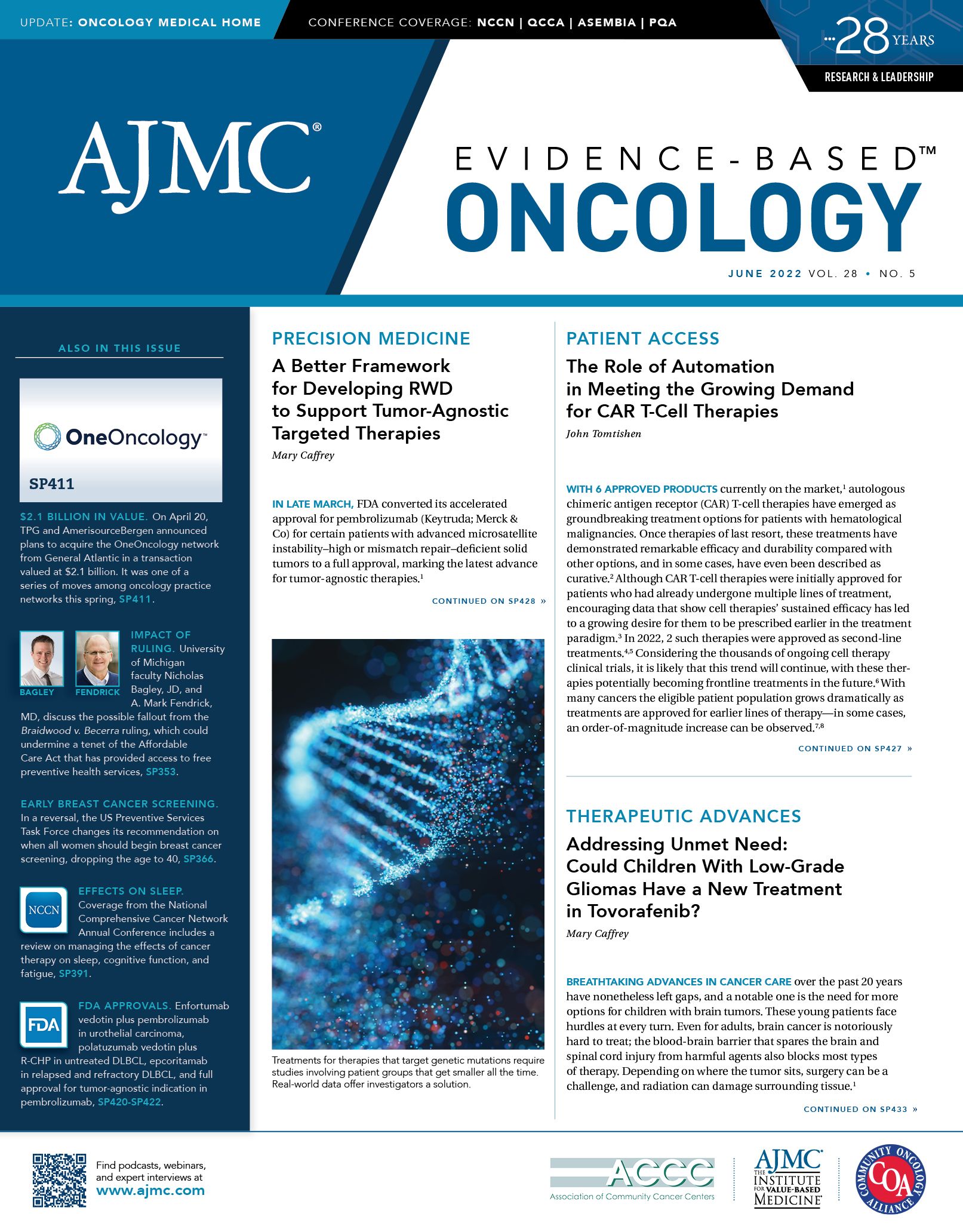- Center on Health Equity & Access
- Clinical
- Health Care Cost
- Health Care Delivery
- Insurance
- Policy
- Technology
- Value-Based Care
Health Equity Spotlights: June 2023
Davey Daniel, MD, on the Importance of Health Equity at OneOncology
Physicians have an obligation to provide diverse groups of patients in their communities with accessible and affordable care, Davey Daniel, MD, chief medical officer at OneOncology, told Evidence-Based Oncology (EBO) during the recent Community Oncology Alliance Community Oncology Conference.
EBO: How does OneOncology approach health equity across its practices?
Daniel: Health equity is what community oncology is all about. We see every patient who walks through the door. We’re committed to…[the] community we live in, that we practice in, and…because most of our patients are in our local area, we actually tend to be far more diverse than…academic institutions—and sometimes even hospital systems. We…have that obligation.
When we talk about health equity, and when I talk to pharma about health equity, the way you reach health equity in research and care is [that] you make the research available at the practice level across multiple sites, not just in large clinics where they can recruit a lot of people in financially well-off communities. You have to make those trials available where patients are being treated. So, for a diverse patient population, it has to be…[at] multiple sites…[in] multiple cities across the country rather than…[in] just a few academic centers.
Samyukta Mullangi, MD, MBA: Cancer Care Navigation Platforms Can Reduce Operational, Financial Challenges of VBC Systems
Partnering with care navigation platforms such as Thyme Care can prove beneficial for oncology practices, particularly smaller or rural clinics, in addressing operational and financial risks associated with the shift from fee-for-service (FFS) to value-based care (VBC) systems, according to Samyukta Mullangi, MD, MBA. Mullangi spoke with Evidence-Based Oncology (EBO) as she was finishing an oncology fellowship at Memorial Sloan Kettering Cancer Center in New York City, New York, is the incoming medical director at Thyme Care.
EBO: Can you speak on the operational and financial challenges that arise from shifting from FFS to VBC and why it would be beneficial to partner with companies such as Thyme Care to ameliorate these issues?
Mullangi: Practices are increasingly making the move from FFS to VBC with good reason. There are a lot of tailwinds orienting them in this direction, [and] almost all are related to the fact that health care spend[ing] is increasingly taking up a greater portion of every dollar spent in this economy.
That being said, transitioning to VBC is a huge operational lift for practices. Even short of participating in fully capitated payments, taking on risk-sharing agreements with insurers represents a complete paradigm shift. Part of the problem is that practices—and this is not unique to cancer, but it’s certainly true in cancer—are not equipped with the right technology tools to pursue population health, nor do they have adequate staffing to address concerns that are unearthed through systematic surveys or the like.
So let me elaborate on the [technology] piece first. Oncologists today, no matter the EMR [electronic medical record] they use, could not tell you basic things [such as] what is the size of their panel, how many patients are on active treatment, how many patients are past first-line therapy in the metastatic setting. No EMR is systematically calculating things [such as] frailty scores or palliative performance scales that can inform the need for advanced care planning or palliative care [consultations], for example.
If patients are admitted or seen in the emergency [department] at a local hospital, oncologists are often only aware of this if they have a good but informal relationship with that hospital’s case manager or the patient or family directly informs them. And that is the state of affairs today; it’s very difficult to pursue population health without a bird’s-eye view of your population.
The staffing piece is equally important. Effective VBC and population health require that oncologists regularly check on how their patients are doing from a symptom standpoint, especially if they’re on active treatment. You’ve heard of electronic patient-reported outcomes [ePROs]; that is becoming more and more the norm. For example, CMS’ upcoming Enhancing Oncology Model requires that practices have a system in place to periodically and regularly collect ePROs from their patients.
It’s also important to unearth social determinants of health, because that plays a huge role in how patients are doing and how they’re able to stay on treatment. But addressing the issues that can arise through these periodic assessments sometimes requires additional staffing. And [although] larger clinics can and may be able to accommodate and absorb these new responsibilities into their existing staffing structure, it is harder for smaller or rural clinics to do so. These new requirements can perpetuate health inequities.
Thyme Care attempts to solve for both. So its [technology] platform allows for intelligent triaging of patient acuity. It has an ePROs platform that performs battery assessments of symptoms and obtains information about social determinants of health. And the way the care model is set up is that there are systematic assessments of patient functioning. All this is supported by teams of navigators and nurses and supervised by a medical director who are [all] fully remote and centralized.
The combination of the [technology] and the staffing that Thyme Care is able to provide represent[s] capabilities that are too expensive or onerous for any clinic to replicate on their own. Honestly, there’s no need. When there are solutions like this in the marketplace, I think practices should partner rather than try to reinvent the wheel.

